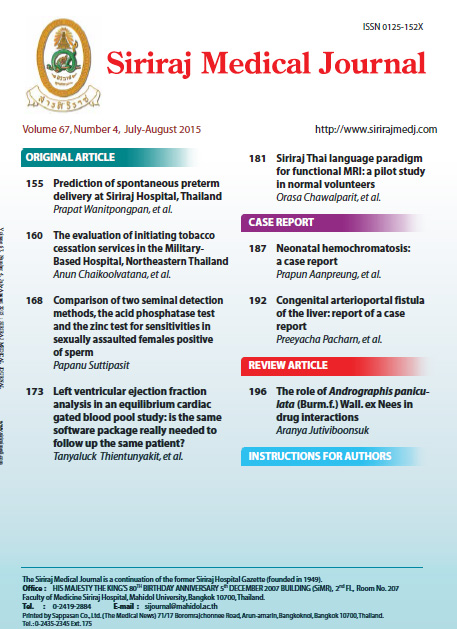The Evaluation of Initiating Tobacco Cessation Services in the Military-Based Hospital, Northeastern Thailand
Abstract
Objective: It aimed to evaluate the effectiveness of the initial smoking cessation services at amilitary-based hospital in northeastern Thailand.
Methods: It was a prospective, descriptive design. Totally, there were 1,094 conscripts who participated in the 6-month cessation program. Patient history data was collected via a patient history record divided into three different periods of time at, 1st visit, 2nd visit (3-months), and 3rd visit (6-months). Each participant underwent ‘going cold turkey’ with tobacco cessation approach. Sociodemographic characteristics and continuous variables (e.g., age, duration of smoking) were analyzed via descriptive statistics. Spearman correlation coefficient was used for the relation between predictor and dependent variables (quit success). The relations between sociodemographic data and the prospects of quitting smoking were analyzed via multiple logistic regression.
Results: Most participants were males (99.84%), and regular drinkers (55.50%). They usually smoked 12.37 cigarettes per day. For first visit, every participant underwent ‘going cold turkey’ with tobacco cessation approach to quit smoking (from 1st to 3rd visit). An average CO level was 3.23 ppm. Around twelve percent of participants used 0.5% sodium nitrate mouthwash. At the second visit (3-months), numbers of cigarettes decreased to 5.48 cigarettes per day and numbers of participants were decreased to 792 personnel. Only 150 persons continue to quit smoking (18.95%). At the last visit (6-months), a total number of participants were 688 personnel. Numbers of cigarettes were decreased to 5.48 cigarettes per day. Only 78 persons completely quit smoking (11.34%), and approximately 18.02% of participants still used 0.5% sodium nitrate mouthwash. Additionally, only three sociodemographic data including, CO level, duration of counseling, and use of first line treatment were statistically related to the prospects of quitting smoking (p<.05, .001 respectively). The equation of the prospect of quit smoking was statistically related to those sociodemographic characteristics.
Conclusion: Tobacco cessation services in a military-based hospital were well received and short term outcomes of conscripts seeking help was encouraging. The integration of tobacco cessation with existing healthcare services in the military-based hospitals is necessary. Finally, further evaluations of the effectiveness of cessation services among conscripts in the military-based hospitals need to be conducted.
Keywords: Cessation services, military-based hospital, tobacco
Downloads
Published
How to Cite
Issue
Section
License
Authors who publish with this journal agree to the following conditions:
Copyright Transfer
In submitting a manuscript, the authors acknowledge that the work will become the copyrighted property of Siriraj Medical Journal upon publication.
License
Articles are licensed under a Creative Commons Attribution-NonCommercial-NoDerivatives 4.0 International License (CC BY-NC-ND 4.0). This license allows for the sharing of the work for non-commercial purposes with proper attribution to the authors and the journal. However, it does not permit modifications or the creation of derivative works.
Sharing and Access
Authors are encouraged to share their article on their personal or institutional websites and through other non-commercial platforms. Doing so can increase readership and citations.










